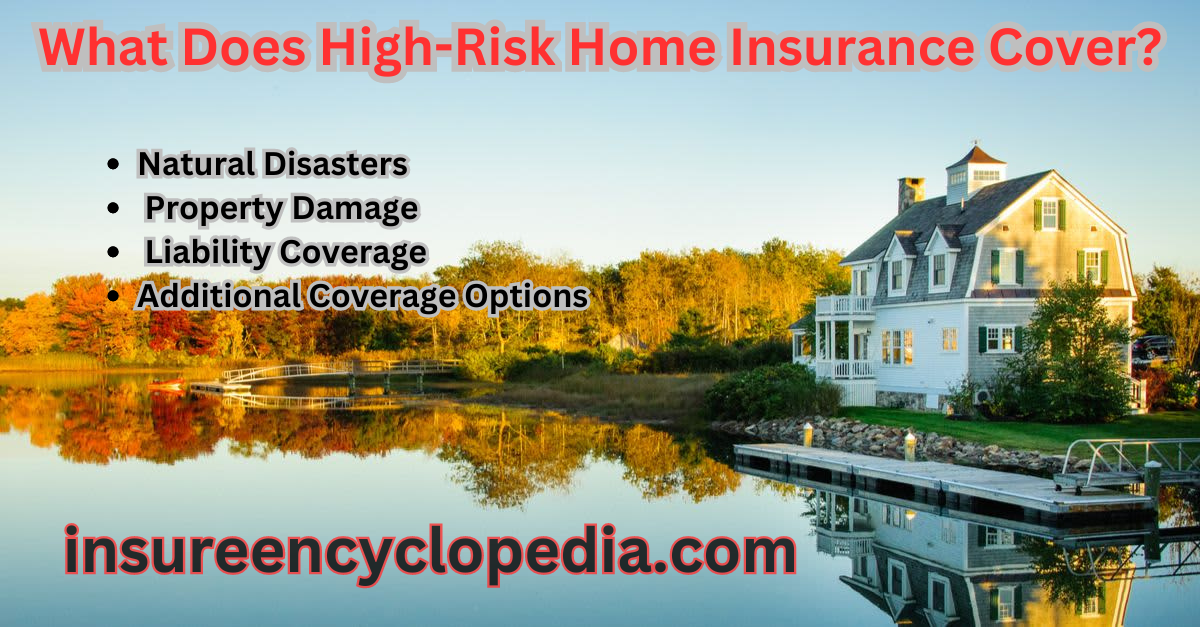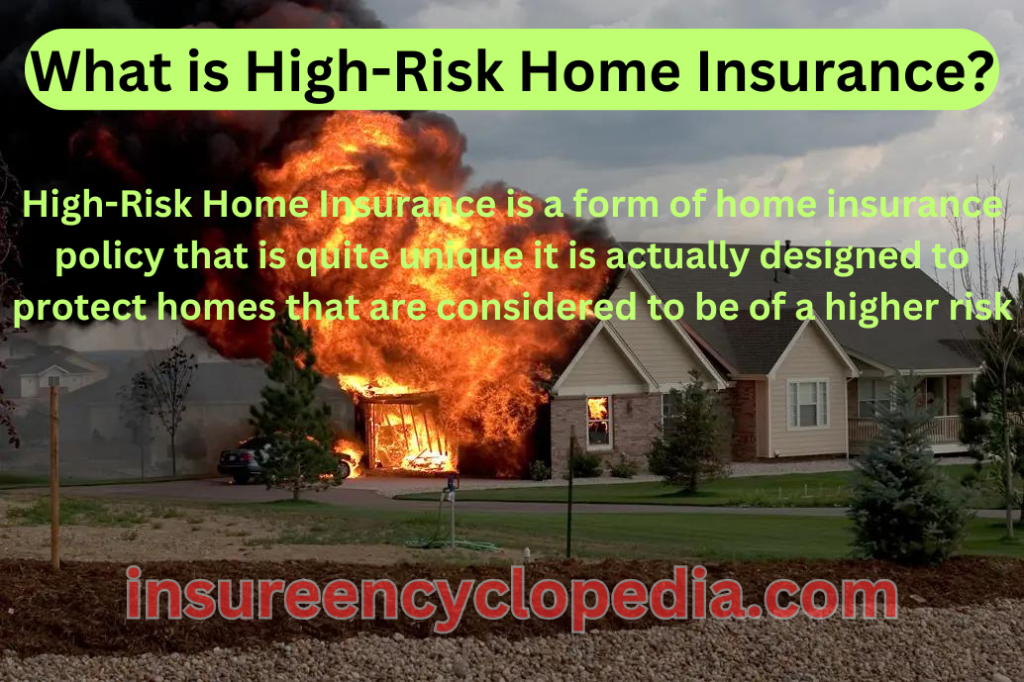What is High-Risk Home Insurance?
High-Risk Home Insurance is a form of home insurance policy that is quite unique it is actually designed to protect homes that are considered to be of a higher risk. They may be situated in regions that are hazardous or are structurally susceptible, or are in bad communities characterized by high crime rates.
Why Do You Need High-Risk Home Insurance?
High-Risk Home Insurance can therefore be defined as a policy through which the homeowners should use to cover risks or losses of the homes or other structures found within the residences since some areas or constructions can be considered more dangerous than others. Here are some key reasons why you may need this type of coverage.
- Protection against Natural Disasters
- Flood insurance: In particular, house insurance can be useful for you in case your house belongs to a special zone where you need to pay increased attention to floods. High-risk home insurance will assist you in insurance of the risks associated with floods which are not covered in the packages of other insurance.
- Earthquake insurance: The high risk home insurance may also have provisions to cater for loss that may have been occasioned by the properties situated in areas that are prone to earthquakes.
- Storm insurance: Such insurance is useful if your house is in a hurricane area the insurance will cover for losses from hurricanes and wind and storm surge.
- Coverage for Unique Risks
- Crime-ridden neighborhoods: Well, if your area is somehow unsafe when it comes to criminal activities, then there is something called special insurance that can cover your home in case it’s robbed, stolen or even vandalized.
- Older homes: Might it be possible that the features of used houses would have several structural deficiencies or other structural vices? These risks can be catered for by high risk home insurance.
- Unique features: Occasionally however, due to the features which the house may possess and which sometimes pose certain risks such as a swimming pool, a detached garage may require a high risk home insurance.
- Peace of Mind
- Financial security: High-Risk Home Insurance is very useful as it provides an individual with cash security in the event of a risk of your property.
- Insurance market access: Thus, if you have certain difficulties in finding normal homeowners insurance, High-Risk Home Insurance will give you an access to the insurance market.

What Does High-Risk Home Insurance Cover?
Extra or premium home insurance policies are intentionally designed to cater for all the risks of the house which are considered to be more vulnerable to being wrecked. While the specific coverage may vary depending on the insurer and the individual policy
- Natural Disasters
- Floods: Shielding as against loss in such a form of flooding; this is flooding by the rise in water in river bodies or by water bolstering.
- Earthquakes: For cushioning against loss in the event of mother earth born, natural oscillations involvement like the structure/ foundation – cracks or loss of property.
- Storms: Hurricane insurance covering force of wind, height of water together with storm surge shelter.
- Other natural disasters: It may also include other natural calamities for instance fire outbreak, tornado, and hailstorm depending with the type of insurance policy to be taken.
- Property Damage
- Structural damage: Elements that are located outside the house and these include the roof, outer walls, foundation and the visible pipe work from outside the house.
- Contents coverage: The Chief Responsible for accepting and inspecting gems and jewelries, clothes, furniture, electronic appliances and any other movable articles taken to the building for residential purposes.
- Additional living expenses: Flood insurance which also includes other costs of temporary lodging in the event that your home is rendered uninhabitable due to flood.
- Liability Coverage
- Personal liability: Third party physical injury or property damage arising out of any accidental happening in which any person that resides with you, your spouse, children or parents or any other member of your household gets involved.
- Loss of use: After a loss reclaim your home is likely to be uninhabitable for a while and the insurance will eye you for expenses for this.
- Additional Coverage Options
- Specialized coverage: Notable examples of risks or perils that are encompassed by high-risk home insurance are for instance pipe burst or coverages for sinkhole.
- Personal property extensions: Besides this a plan that we are going to undertake involve underwriting of items such as jewelry, antiques or works of arts which may tend to be above normal policy limits.
How to Find a High-Risk Home Insurance Provider?
- Assess Your Needs
- Identify your risks: Determine the emerging risk exposures in the area where your property is situated; these may include floods, earthquakes and fire among others.
- Determine coverage requirements: Decide what sort of insurance is enough for the building and all that the building holds, full coverage, partial, or just the basic?
- Research Insurance Companies
- Specialize in high-risk coverage: There is something called High-Risk Home Insurance and you should begin looking for insurance companies that offer this.
- Check reputation: Considering that there are many providers available, do a research about them and find out the reviews about the insurer you are interested in as well as the ratings given to the insurer.
- Obtain Quotes
- Request quotes: One has to make a call on different Insurance companies to get the price quotes of High-Risk Home Insurance.
- Compare coverage and premiums: It is important to seek to know this disparity and also the kind of premiums being offered by the insurers.
- Consider Independent Agents
- Access to multiple insurers: Independent agents will always find a way of availing policies from several insurance companies and thus ensure that they give you the right policy.
- Expert advice: They can be the best source of assistance and advice on any matter which pertains to insurance.
- Ask Questions
- Clarify coverage: Ensure that one is clear to show how much has been given by the insurers like the things that they usually exclude.
- Understand pricing: Questions relating to certain aspects that may affect cost such as the deductible to be paid, the coverage limits and the hazards among others should be asked.
- Review Policy Documents
- Read carefully: One eventually has to read through policy papers that offer the general guidelines on coverage.
- Seek clarification: There is always more depth to the policy you are being offered and if you want to learn more details concerning the policy, you should approach your insurance agent for further explanation.
- Consider Government Programs
- Explore government options: If you are located in a high risk area, contact your state authorities to check on any available programs or subsidies that may be available so that you can be issued with an insurance cover that will adequately protect you but will not are you out financially.


